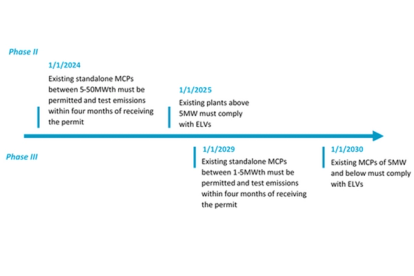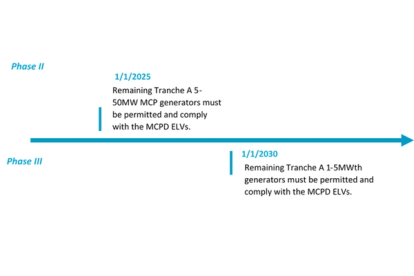
Medium Combustion Plant (MCP) and Specified Generator (SG) Permitting Update – Early Permitting for England
- Post Date
- 27 February 2023
- Read Time
- 3 minutes

Understanding the Requirements
The Environmental Permitting (England and Wales) Regulations (EPR) were amended in 2018 to implement the requirements of the MCPD. Medium Combustion Plant (MCPs) are defined as combustion plants with a thermal input rating between 1MWth and 50MWth. When transposing the requirements of the MCPD into the EPR, the Department for Environment, Food & Rural Affairs (Defra) introduced additional controls for Specified Generators (SGs). SGs are those MCPs that generate electricity.
In short, the amendments require operators to obtain and comply with the conditions of an environmental permit if they operate MCPs or SGs, with a small number of exemptions.
Permitting Dates
Schedule 25 of the EPR introduced a phased approach to the permitting of MCPs and SGs. The date by which an MCP or SG is required to have a permit varies depending on a number of factors, including the capacity of the combustion plant, the date it was brought into operation and, in the case of SGs, the date of capacity market or balancing service contracts.
As detailed in our MCP/SG permitting update article published earlier this year, Medium Combustion Plant Directive (MCPD): do you have the correct permits?, ‘Phase I’ of MCP & SG permitting is coming to a close.
The EA is now starting the next set of permitting in line with the EPR, for combustion plant co-located at the same site, as summarised below:

Figure 1: Phase II and Phase III key dates for MCPs

Figure 2: Phase II and Phase III key dates for SGs
Early Permitting Update
The EA are now offering early permitting of both Phase II and Phase III MCPs & SGs, allowing sites to incorporate ‘existing’ plant into a new or variation application submission, even when the ‘existing’ plant’s permitting date is not for several years.
This has been offered as a way of providing a more flexible approach to the MCP & SG permitting system, and in some cases preventing the need for additional future variation applications to incorporate future phases to a permit. This could benefit you as an operator through reducing application costs, time, and the administrative burden of submitting multiple variation applications.
There are a number of specific circumstances where a site may be eligible for early permitting. These are mostly where a new permit application or permit variation is already being applied for, and existing MCP and / or Tranche A SG are co-located at the same facility.
Should I apply for early permitting?
The main benefit of applying for early permitting is to avoid future variations, therefore you must consider if plant on your site will be in the scope of Phase II or Phase III.
The statement released by the EA also outlined the following points, which may influence the decision whether to apply for early permitting;
- Compliance requirements will be post-dated to that given in the legislation – an important point regarding emission limit values (ELVs), meaning compliance with ELVs will not be brought forward to the date of permit issue, where the MCPD/SG Regulations specify a later compliance date.
- Existing application charges are applicable in the case of new applications.
- In the case of variation applications, where existing MCP/SG were included in the original permit application air quality assessment, at least a minor technical variation charge would be applied. Where additional assessment of the impact to habitats/air quality is needed, a minimum charge of a normal variation will be applied.
- There is a low risk that regulations may change in terms of the requirement for permitting or that the compliance deadlines may change (particularly 2029). If this did happen, it may mean that operators would need to make an application to vary the permit in the future anyway.
If you think your site may be eligible for early permitting and wish to discuss your options further, or if you simply require further advice on whether you are eligible for early permitting, then please do not hesitate to contact us.
Recent posts
-

-

-

Understanding sound flanking: Fire alarm speaker cable conduits in multi-family buildings
by Neil Vyas
View post